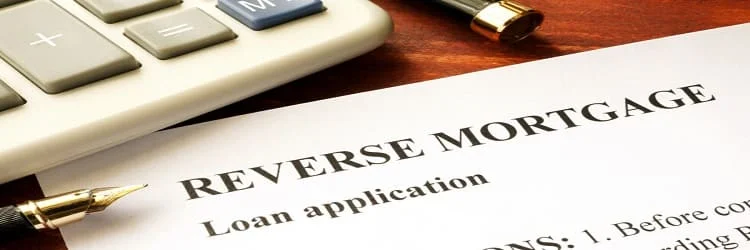What about a Reverse Mortgage? If you are 62 or older, you may be sitting in a gold mine. That's right, we said “in.” Maybe that should be “in a bank vault.” Anyway, those homeowners that are 62 years of age are eligible to apply for a Reverse Mortgage Loan. That's the one you see advertised on tv with the former tv and movie action star as a spokesperson. Although he explains it pretty well, here's a look at the nuts and bolts of the deal.
The only reverse mortgage insured by the U.S. Federal Government is a Home Equity Conversion Mortgage or a HECM Reverse Mortgage. A Home Equity Conversion Mortgage is for older homeowners interested in converting the equity in their house into a steady income. With a reverse mortgage, the homeowner is eligible to stay in their home for the mortgage duration.
How Does A Reverse Mortgage Work?
As mentioned earlier, if you're over 62 and have paid off your mortgage entirely, or partially, you can use that collateral for a loan. But with a big difference. You don't have to repay it. If you choose not to repay the loan, then the lender may end up owning part or all of your home when you die, permanently move out, or sell it. Then they get the repayment from those funds. Plus, the interest that has accrued. When funding this type of loan, Mortgage Lenders look to fulfill the following criteria:
- Reverse mortgages are only for homeowners 62 or older.
- The home must be paid off or have significant equity. In circumstances where a homeowner has not paid off the mortgage, the loan can still be made, but the funds will be used first to pay off the remainder of the mortgage.
- The amount of money borrowed is determined by the appraised value of the home, the current interest rate, and the youngest borrower's age. The Federal Housing Administration can also place limits on the loan amount.
It sounds like a great concept, but there are limits. Even if your current mortgage is paid off, you may not be able to borrow the entire value of your home. Why?
Because the maximum amount a homeowner can borrow, the Principal Limit, is dependent on:
- the age of the youngest borrower or eligible non-borrowing spouse
- the home's value
- the current interest rate
- the HECM mortgage limit ($822,375 in 2021)
Homeowners may be eligible for a higher principal limit:
- the older they are,
- the more the property is worth and the
- a lower interest rate.
The amount also might increase if the borrower has a variable-rate HECM. Those options include:
- Equal monthly payments, provided at least one borrower claims it as their primary residence
- Equal monthly payments for a fixed period of months
- A line of credit that can be accessed until the loan runs out of funds
- A combination of a line of credit and fixed monthly payments
- Both a line of credit and fixed monthly payments for a set length of time
A HECM with a fixed interest rate pays out in a single, lump-sum payment. And the interest on a reverse mortgage accumulates every month, and borrowers still need to have enough income to continue to pay for property taxes, homeowners' insurance, and upkeep.
Three Protections Included In Reverse Mortgage Loan
The reverse mortgage has been bashed for years because of a few unscrupulous lenders who sometimes defrauded their borrowers. This was a charge that has little relevance in today's market. As we've mentioned earlier, there are many government safeguards in place. Specifically:
- No-Risk Of Debt - Since the money is yours, you no longer need to borrow money to pay for the mortgage, medical expenses, vacations, daily expenses, improvements, or repairs to the home.
- Security - If you've encountered financial problems and had to borrow money, no one can take your home away from you if you can't pay it back.
- Payment Flexibility - There are many options for getting the money from your reverse mortgage. Equal monthly payments, a lump sum, a line of credit, or a combination of these options.
The reverse mortgage is a big step for homeowners, so they should be cognizant of all ramifications.
Pros
- The borrower doesn't make monthly payments toward the loan balance
- The funds can be used for anything
- non-borrowing spouses not listed on the mortgage can remain in the home after the borrower dies.
- The borrower must maintain the house and pay property taxes and homeowners insurance Cons
- It forces you to borrow against the equity in your home, which could be a key source of retirement funds
- Since this is a relatively uncommon mortgage, Mortgage Loan Processing fees and other closing costs can be high and will lower the amount of cash that is available
So, if a reverse mortgage sounds like a solution to your current needs, talk to a lender specializing in this mortgage product. Many lenders using a Mortgage BPO offer these services.

Leave A Reply